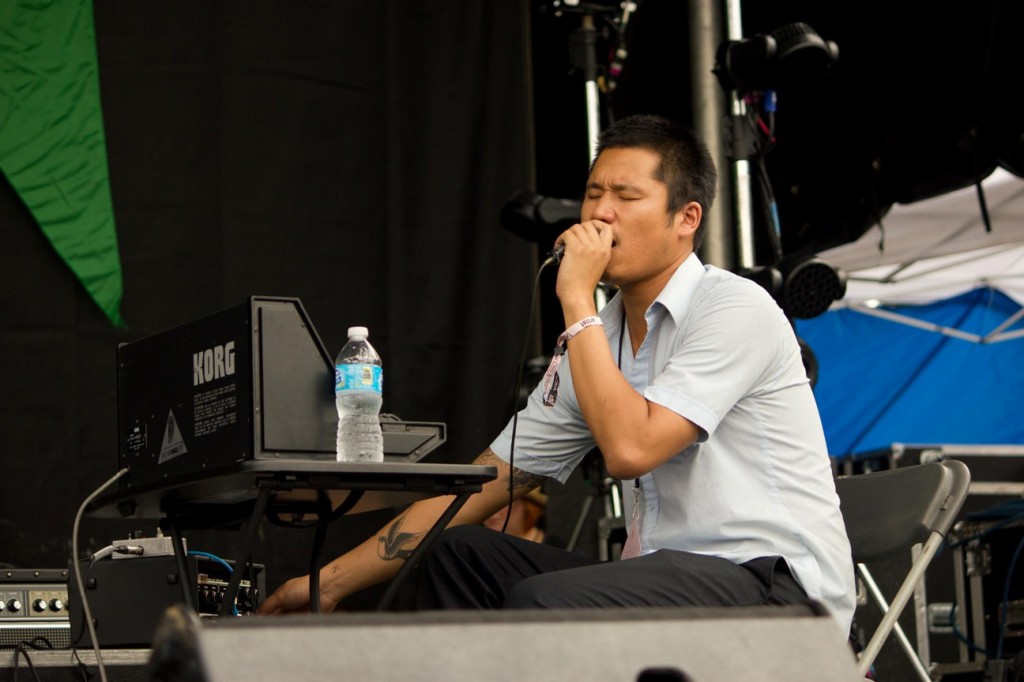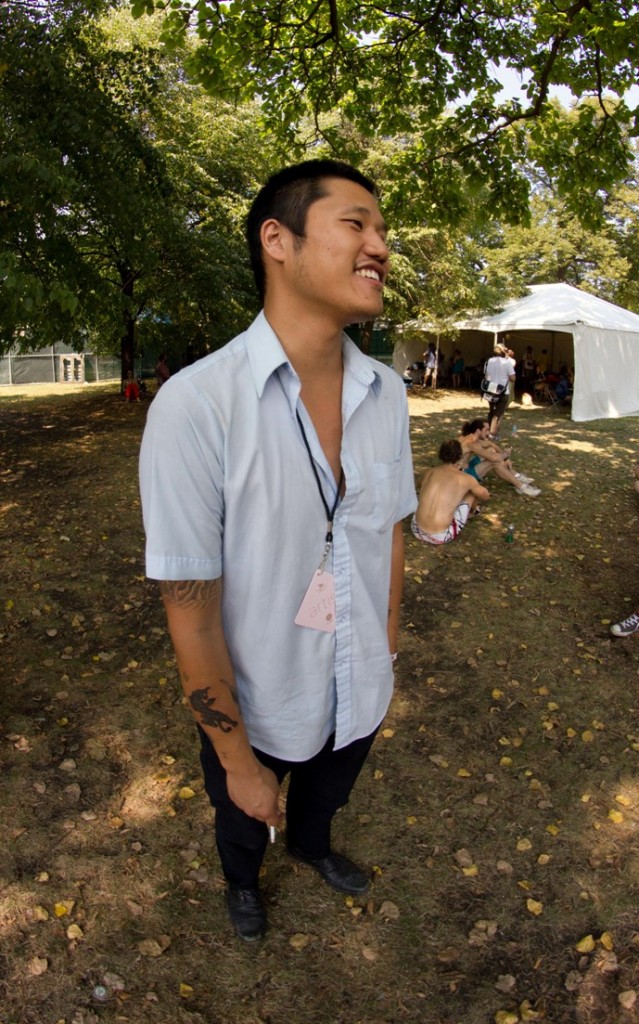by Raj Ranade
The first band-mates of Alex Zhang Hungtai, the man behind the fascinating art-rock project Dirty Beaches, didn’t exactly mince words when explaining why they had to kick him out of their metal band. “The exact quote was ‘you sing too much like a p***y,'” said Hungtai, who wasn’t particularly interested in performing the tonsil-shredding screams that his colleagues were after. “So I said, ‘Well, f**k you guys, then.’ And I bought myself a cheap $50 guitar from a pawn shop and taught myself how to play. Maybe I should thank them.”
Zhang Hungtai may also owe plenty to non-metalhead influences – the mournful crooning of Roy Orbison, the throbbing backbeats of the 70s protopunk duo Suicide, the films of David Lynch and Wong Kar-Wai – but on-stage, he has a canny flair for atmospherics and misdirection that’s all his own. Zhang Hungtai started his Sunday Pitchfork set sitting hunched over a keyboard creating a wash of ambient drones and oscillating synthesizers. (This may have been to soothe what he later admitted to the audience was a hangover.) But Zhang Hungtai and his guitarist started to coil up tension as they started into the ballad “A Hundred Highways”, and they released it soon afterward. The rest of the set was unleashed aggression –distorted guitar riffs and dusty drum samples supporting Zhang Hungtai as he howled into a microphone, his voice filtered to sound like an anguished AM radio transmission.
It was a raw, full-throated performance that stood in contrast to Zhang Hungtai’s manner during our interview – soft-voiced, with a reserved smile and eloquence about his musical process. “I think about the process in cinematic terms,” he said. “I’m not interesting in having a particular sound that is the ‘Dirty Beaches sound’. I have a [song] idea and do a bunch of research to find an aesthetic. It’s kind of like casting – the sound is the leading man. It’s the face of the film, the spirit and soul of it.” That cinematic mindset may have come from Zhang Hungtai’s long hours working as a video clerk. “The rental store was mostly for porno, but they also had a huge art-house and foreign section. The novelty of watching porno late at night grew old really fast, so I just started watching really good movies instead.”
He developed a particular adoration for the works of David Lynch and Wong Kar-Wai, which is evident on Badlands, Dirty Beaches’ breakthrough 2011 album. Like the work of those filmmakers, Badlands looks at tokens of an idealized past with a skewed, critical lens – in this case, about the romanticized rock-and-roll dream of life on the open road. Zhang Hungtai mentioned that the title is a reference to the Bruce Springsteen hit, but Hungtai’s writing approach is less “Born to Run” than it is “State Trooper” – these are songs loaded with menace, melancholy, and fear. “I don’t like to portray [the past] as if everything was hunky-dory. I just like to portray what’s real to me. I like when fiction collides with nonfiction.”
That clash between the ideal and the real can be seen even in the story of Zhang Hungtai’s Taiwanese father – the 50s pop leanings on the album were meant as a tribute to him. “I had always looked at [my father] as a guy who goes to work and reads newspapers and gives you the father-son talk every once in a while – a very silent man. But I just recently found all these pictures of him when he was younger, on a motorcycle, or with his boys in this gang. He had just emigrated from Shanghai to Taiwan, and there was a lot of hostility against people from China at the time. [Taiwan] had just been liberated from Japanese occupation, and then Chiang Kai-Shek’s party, who had lost to Mao’s Communists, took their military and took over Taiwan. So there was a lot of resentment against Chinese immigrants and they had to protect themselves, so they banded together.”
Zhang Hungtai has followed up on the success of Badlands with a series of singles and one particularly intense live set performed in Norway. The Spirit of Crazy Horse was the serendipitous result of Zhang Hungtai and his band losing their equipment in an airline snafu and having to improvise with a makeshift instrument kit. Without their equipment, the band couldn’t perform most of their songs, but they brought a raucous energy to a set of covers and originals that the crowd adored. The result seems to have really inspired Zhang Hungtai for the future. “For the past five years, I’d been playing for five to thirty people in basement shows and dive bars. And now we’re playing to thousands of people at a festival, or playing really huge ballrooms in Europe. You’d expect that the audience would want to hear the songs they know – that they’d almost demand it. But the audience responded so well in Norway that we were really impressed. It taught me that you should never underestimate your listeners and that you should just do what you want to do, instead of trying to please the general masses. Your listeners like you for a reason.”
Raj’s Ace Pitchfork Coverage
Read Raj’s 2012 Pitchfork Festival Ace Wrap-Up here.
Read Raj’s Pitchfork Festival Preview here.
Read Raj’s Pitchfork Festival Live Blog here.
Read Raj’s interview with The Olivia Tremor Control here.
Read Raj’s interview with Alex Zhang Hungtai of Dirty Beaches here.
To check out the Dirty Beaches, click here for the iTunes link.
[amazon asin=B005COJDQ6&template=iframe image&chan=default]







